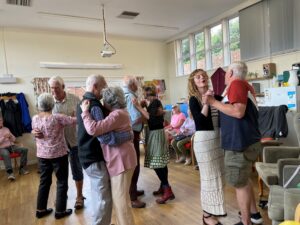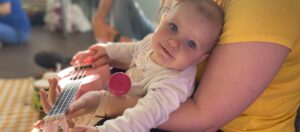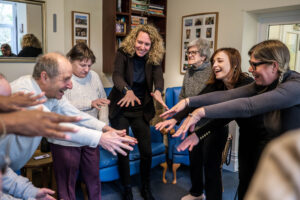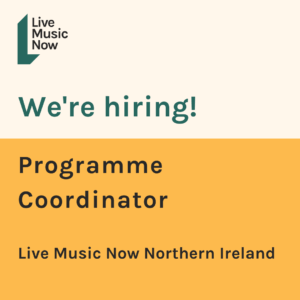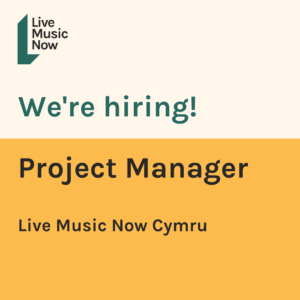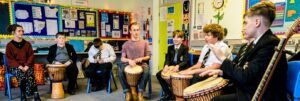Bristol-based LMN musicians Zeb and Sam Haynes are brothers who sing and play a range of acoustic instruments. They call their duo 'Paperhorse', and have just completed their first tour of special schools. They met up with LMN's Evan Dawson to describe some of their experiences.

ED: How did you first hear about LMN, and what made you want to get involved with us?
Zeb: It was our mum! She's a school teacher in North Yorkshire, and they'd had regular visits from LMN groups, and her children loved them, and she suggested we should apply.
Sam: We liked the idea of taking our music into different places. We initially expected to be going mostly to schools, but our visits to care homes have been really amazing.
ED: Tell me a little more about your music.
Zeb: We play rock and pop – we play a really upbeat and happy style of pop, to a really high standard. We've been playing covers like 'Hound Dog' by Elvis, and 'Happy' by Farrell Williams. As well as playing a range of our own music.
Sam: I found the audition quite an interesting experience. We were very different from most of the others there, who were dressed much more smartly than us.
ED: What were your first experiences with LMN?
Sam: We did various bits of training in London, which were really good.
Zeb: Then we had visits to some care homes in Bristol.
Sam: I was really nervous before those first sessions. I wasn't nervous about our music, but we weren't sure if we would be entertaining to people in those settings. Some people didn't seem to respond very much, whilst others clearly loved it. The only way to tell if we were doing well was by speaking to the carers.
Zeb: At the first session we did, lots of people were dancing. One carer told us afterwards that this had never happened before. She also said that she'd noticed that many of the people who'd been sitting throughout had done unusual things too; like for one gentleman, simply smiling and staying awake was really significant. It felt great to hear that.
Sam: The first time I was in the care home, I was profoundly affected by it. I'd never met older people like this before. I felt really sad about it. I think I let myself be affected by it, somehow. It took me a while to get over it, but at the same time it felt really good to be able to do something for them.
Zeb: It seemed wrong that older people are locked away from the rest of society. We came to feel that we could bring the outside world back in, through our music.
ED: You've just completed a tour of seven special schools in Dorset, over the space of four days. How did you find this?
Zeb: The first school we went to was brilliant, and really set us going. The staff were really encouraging. They were happy for the children to dance around us, and come up and touch the instruments while we were playing. It was a big mix of ages, from about four years old to ten. They responded so well: when we played quiet pieces, they would sit quietly. But then they really responded to the energetic music too.
ED: How did you select what music to play?
Sam: We started and finished with pieces that were familiar to them, like 'You've got a friend' by Randy Newman, which was in Toy Story. But we also played our own songs. We felt it was important not to patronise, and to be true to ourselves.
Zeb: We talked to some of the teachers about this. It's really important that we keep our own musical credibility, and be 'genuine',. For the older children particularly, we earned their respect by playing our own music, and performing things that were technically difficult.
Sam: We got better and better at finding ways for the children to interact with us and with the music. We found that simple dancing challenges were good, like marching, clapping, throwing hands in the air, or joining in with the chorus at different points.
Zeb: Again, going into some of the schools made us feel really sad afterwards, but the teachers looked after us really well. They said that the children were having the best quality of life possible, and that our music had made them really happy. I think we might have underestimated how this would affect us, but I'm so glad we've done it, and we feel much more confident about it all now.
